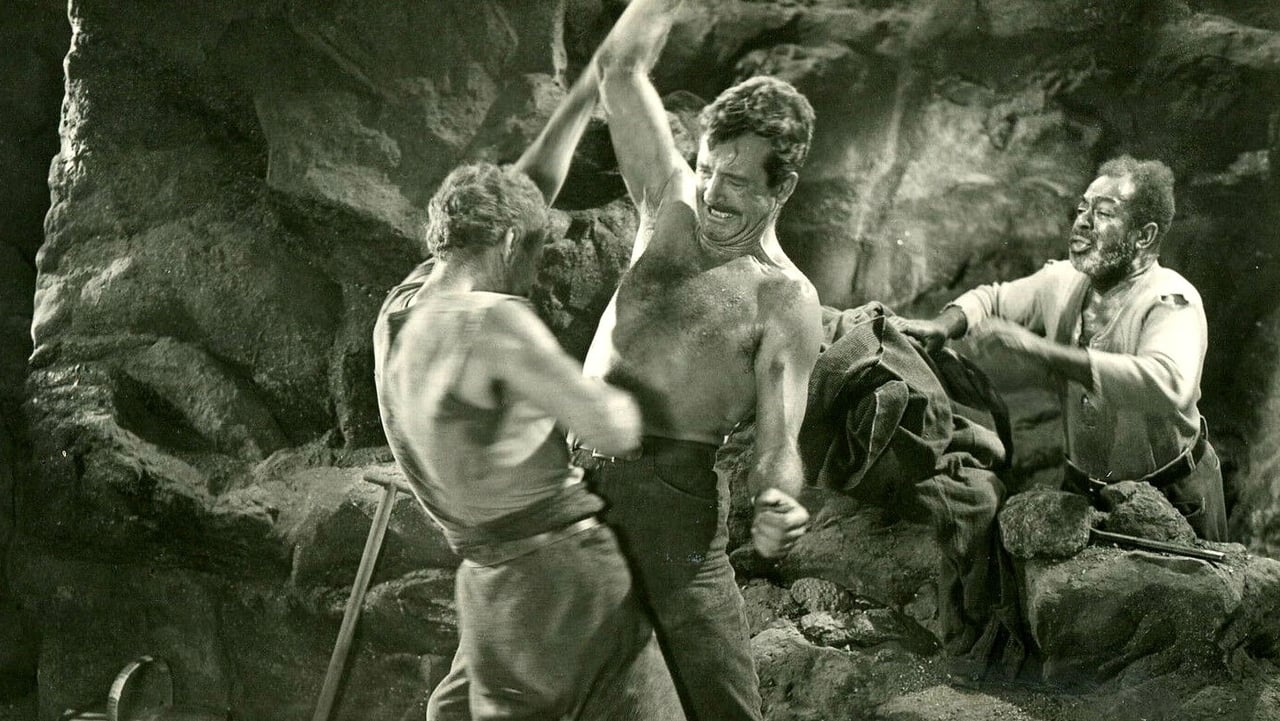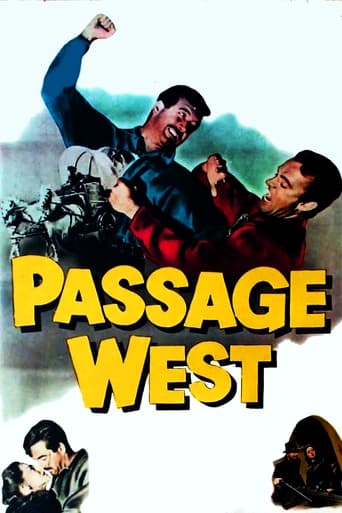

"Passage West" is one of those odd little films that's more than the sum of its parts. The acting is nothing to write home about, and the directing is little more than perfunctory. But it has an odd sincerity and integrity that gives it inexplicable appeal.The script is no prize-winner, but the director could have done a lot more with it. On the other hand, his rather dead-pan direction avoids punching up all the clichés. And this story is mostly clichés.But not totally. There's a scene where a mother whose infant has died goes crazy and sings to a doll in the cradle that held the child. There are other "small moments" like that.My favorite moment comes when the wagon master (a minister) finally gets sufficiently fed up with the leader of the criminals who've taken over, and punches him out. What follows is one of the longest (and well-choreographed) fist fights I've seen. (I'm working on a script with a major fist fight, and have added this scene as a reference, should the film ever get made. Hah, hah, hah.)"Passage West" is one of those films to watch during a period of insomnia. (It's just aired twice on Grit.) You won't be ecstatic, but neither will you feel your time has been wasted,
... View MoreBlacklisted screenwriter Alvah Bessie, one of the Hollywood Ten penned the story for Passage West. Had he been blacklisted for bad writing on seeing this one rather than political opinions he might not have obtained martyrdom. This is a rather unreal story of six escaped convicts who inflict themselves on a wagon train bound for California headed by preacher Dennis O'Keefe. The leader of the convicts is John Payne whose career path was like Dick Powell's completely sheds his boyish crooning image for being a complete tough guy.Unfortunately unlike Dick Powell this was not a Murder My Sweet success for him. Payne did many interesting roles in B films during the Fifties, but this was not one of them. Dennis O'Keefe who was something of a raffish fellow also just does not ring true as a frontier preacher. He and Payne have a rivalry of sorts over Arleen Whelan who is scheduled to marry preacher O'Keefe after the journey is over starts reassessing things with the sight of a shirtless Payne sporting a very hairy chest. In complete contrast to his earlier days when 20th Century Fox had him apparently shave it.Some of the convicts include Frank Faylen, Richard Rober, and in his farewell performance Dooley Wilson, the famous Sam of Casablanca as an escaped slave who was in prison apparently for just that. Also Mary Beth Hughes has an interesting role as a saloon entertainer along with the preacher's wagon train. She provides a note of wisdom occasionally.Pine-Thomas who produced some interesting B films for Paramount came up very short with this one.
... View MoreWhile not a notable piece of film-making, this modest western offers so many satisfactions and surprises that it almost merits the designation of "undiscovered gem." After an opening sequence that quickly and efficiently sets up the story, we learn that John Payne will, unexpectedly, play the movie's "bad guy." He's a killer who seems to take grim pleasure in the fact that his escape from prison resulted in the deaths of three guards. There's no attempt to soften his image by suggesting he'd been unjustly convicted and there's no plea for sympathy by, for example, showing a back cruelly scarred by an overseer's whip.After taking over Dennis O'Keefe's wagon train, Payne seems drawn to leading lady Arleen Whelan but aside from one passionate kiss in a rainstorm, the standard romance between these two never develops. What's more, Whelan's character defies what would have ordinarily been a "goody-goody" role. She's by turns cynical, sullen, and selfish and she never becomes particularly likable.Dooley ("Casablanca") Wilson also appears in the cast at a time when black faces were rarely featured in movies in general and in westerns in particular.As the wagon train that Payne and his cohorts take over makes its way to California, the usual hardships occur but they seem a bit starker than usual. A baby dies from lack of milk, its mother drifts into madness, a calf greatly valued by its elderly owners breaks its leg and must be destroyed, a schoolteacher's prize collection of seedlings gets tossed by the side of the road, a father must bury his child. Only at the end of their journey do these pioneers find any respite from their troubles but then there's an explosion inside a tunnel which results in a death and a shift in relationships few would have expected at the start of the movie.Since Lewis Foster's work classifies him as little more than a journeyman director, the unique qualities of "Passage West" can probably be ascribed to the script co-written by the blacklisted writer, Alvah Bessie. Loyal Griggs, who later won an Oscar nomination for "The Ten Commandments," provides the cinematography which is heavily slanted toward exterior shots. In fact, the first interior, (a saloon), comes at the movie's three-quarters mark.John Payne, with an uncharacteristic mustache, and Dennis O'Keefe work together much better here than in their earlier "The Eagle and the Hawk" but minor actress Arleen Whelan can do little with the intriguing but sketchily-drawn figure of "Rose." As might be expected -- most notably in the tunnel sequence -- Payne gets a chance to shed his shirt revealing that thatch of chest-hair he had to shave off during his clean-cut and boyish days back in the 1940s.
... View MoreAlthough this Western starts with some good ideas, based on a not particularly important book by Alvah Bessie & Nedrick Young (who were both at the Hollywood's black list, having been accused for Communist sympathies), the script fails to develop them further. The production is cheap, the directory typical for the genre and without signs of imagination, while the actors and actresses are incapable to blow life in the characters. I have given it 3 out of 10.
... View More